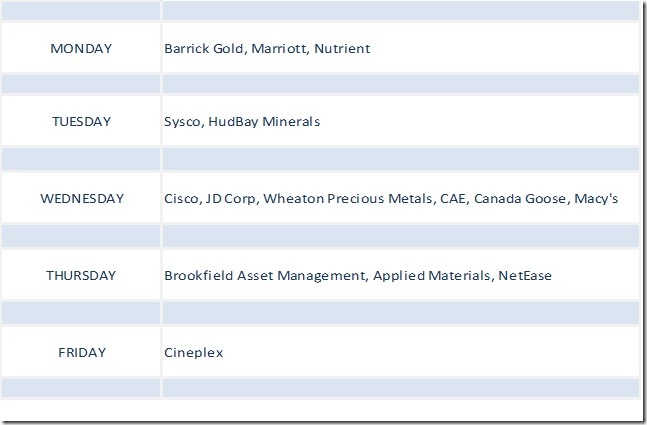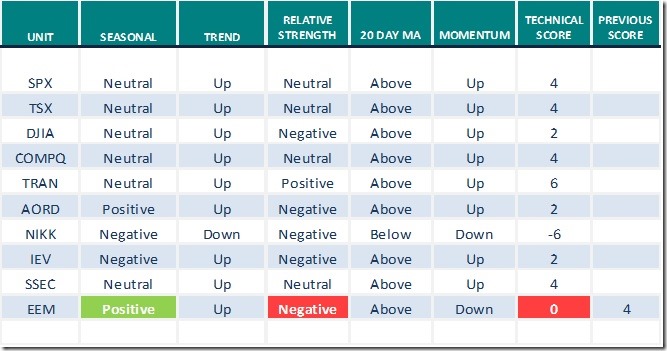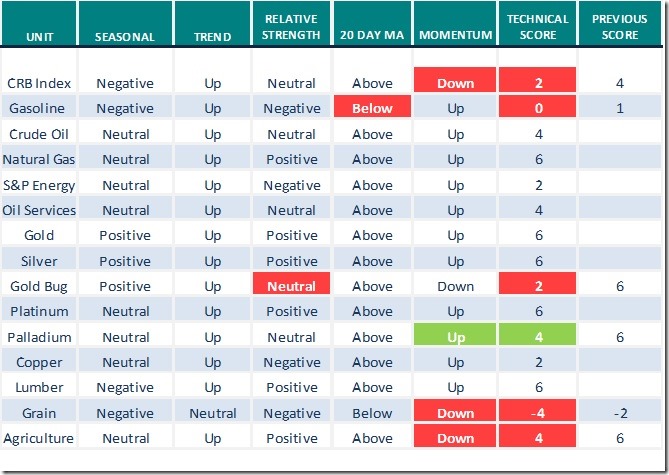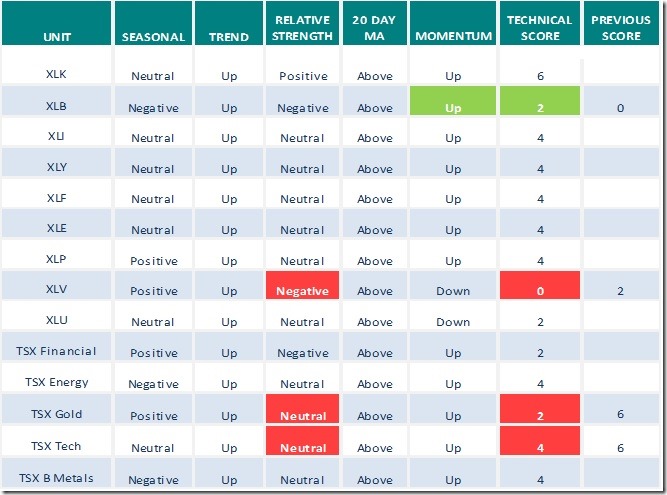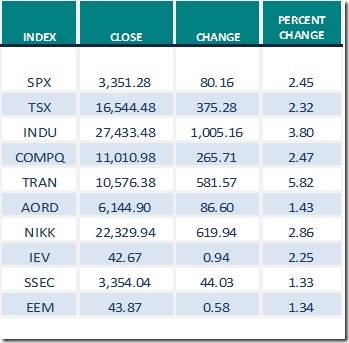by Don Vialoux, EquityClock.com
The Bottom Line
Most equity indices around the world moved slightly higher last week. Major influences remain concern about a second wave of the coronavirus (negative) and possibility of approval of a vaccine (positive). Momentum indicators for North American equity markets remained intermediate overbought and past their peak. The VIX Index remained elevated and typically moves higher between now and early October. Seasonal influences for most equity markets around the world tend to be slightly negative between now and early October (particularly during U.S. Presidential election years). Look for volatile, choppy equity markets between now and at least mid-October.
Observations
The VIX Index (better known as the Fear Index) remained elevated last week. Intermediate trend is flat/down. Watch for moves above 20, 50 and 200 day moving averages to signal a change in intermediate trend.
U.S. equity indices during U.S. Presidential Election years have a history of moving flat/lower from mid/late August to mid/late October.
Broadly based U.S. equity indices moved to new highs last week thanks mainly to continued strength in FAANG stocks + Microsoft. They are the “heavy weights” in the Dow Jones Industrial Average, S&P 500 Index, NASDAQ 100 Index and NASDAQ Composite Index.
Medium term technical indicators for U.S. equity markets (e.g. Percent of S&P 500 stocks trading above their 50 day moving average) moved higher and remained overbought last week. See Barometer chart at the end of this report.
Medium term technical indicators for Canadian equity markets also moved higher and remained overbought last week. See Barometer chart at the end of this report.
Most short term short term momentum indicators for U.S. markets and sectors (20 day moving averages, short term momentum indicators) turned higher last week.
Most short term momentum indicators for Canadian markets/sectors were mixed last week.
Year-over-year 2020 consensus earnings declines by S&P 500 companies became less negative again last week. Eighty nine percent of companies have reported second quarter results to date with 83% reporting higher than consensus earnings. According to FactSet, second quarter 2020 earnings are expected to fall 33.8% (versus a drop of 35.7% last week) and revenues are expected to drop 9.8% (versus 9.6% last week). Third quarter earnings are expected to fall 22.9% and revenues are expected to decrease 4.4% (versus 4.5% last week). Fourth quarter earnings are expected to drop 12.8% (versus 12.1% last week) and revenues are expected to decline 1.4% (versus 1.3% last week). Earnings for all of 2020 are expected to fall 19.0% (versus 19.4% last week) and revenues are expected to decline 3.2%.
Consensus estimates for earnings and revenues by S&P 500 companies turn positive on a year-over-year basis in the first quarter of 2021. According to FactSet, earnings in the first quarter of 2021are expected to increase 12.9% (versus 13.4% last week) and revenues are expected to increase 3.1% (versus 3.2% last week). Earnings for all of 2021 are expected to increase 26.5% (versus 27.0% last week) and revenues are expected to increase 8.4%.
Economic News This Week
July Producer Price Index to be released at 8:30 AM EDT on Tuesday is expected to increase 0.3% versus a decline of 0.2% in June. Excluding food and energy, July Producer Price Index is expected to increase 0.1% versus a decline of 0.3% in June.
July Consumer Price Index to be released at 8:30 AM EDT on Wednesday is expected to increase 0.4% versus a gain of 0.6% in June. Excluding food and energy, July Consumer Price Index is expected to increase 0.2% versus a gain of 0.2% in June.
July Retail Sales to be released at 8:30 AM EDT on Friday is expected to increase 1.7% versus a gain of 7.5% in June. Excluding auto sales, July Retail Sales are expected to increase 1.3% versus a gain of 7.3% in June.
July Capacity Utilization to be released at 9:15 AM EDT on Friday is expected to improve to 70.3 from 68.6 in June. July Industrial Production is expected to increase 3.3 versus a gain of 5.4 in June.
June Business Inventories to be released at 10:00 AM EDT on Friday are expected to slip 1.2% versus a drop of 2.3% in May.
August Michigan Consumer Sentiment Index to be released at 10:00 AM EDT on Friday is expected to slip to 71.5 from 72.5 in July.
Selected Earnings News This Week
Trader’s Corner
Equity Indices and related ETFs
Daily Seasonal/Technical Equity Trends for August 7th 2020
Green: Increase from previous day
Red: Decrease from previous day
Commodities
Seasonal/Technical Commodities Trends for August 7th 2020
Green: Increase from previous day
Red: Decrease from previous day
Sectors
Daily Seasonal/Technical Sector Trends for August 7th 2020
Green: Increase from previous day
Red: Decrease from previous day
Technical Scores
Calculated as follows:
Intermediate Uptrend based on at least 20 trading days: Score 2
(Higher highs and higher lows)
Intermediate Neutral trend: Score 0
(Not up or down)
Intermediate Downtrend: Score -2
(Lower highs and lower lows)
Outperformance relative to the S&P 500 Index: Score: 2
Neutral Performance relative to the S&P 500 Index: 0
Underperformance relative to the S&P 500 Index: Score –2
Above 20 day moving average: Score 1
At 20 day moving average: Score: 0
Below 20 day moving average: –1
Up trending momentum indicators (Daily Stochastics, RSI and MACD): 1
Mixed momentum indicators: 0
Down trending momentum indicators: –1
Technical scores range from -6 to +6. Technical buy signals based on the above guidelines start when a security advances to at least 0.0, but preferably 2.0 or higher. Technical sell/short signals start when a security descends to 0, but preferably -2.0 or lower.
Long positions require maintaining a technical score of -2.0 or higher. Conversely, a short position requires maintaining a technical score of +2.0 or lower
Changes Last Week
Investor’s Digest
Don Vialoux was asked by the publication for a “Top Pick” late last week. Choice was HUV on the TSX, an ETF that tracks the VIX Index. Look for increased volatility by the S&P 500 between now and late this year due to a series of events (e.g. COVID 19 concerns, U.S. Presidential election rhetoric, etc.).The article was published over the weekend.
Technical Notes for August 7th
Biogen (BIIB), a NASDAQ 100 stock moved above $404.20 setting an intermediate uptrend.
Dollarama (DOL) , a TSX 60 stock moved above $50.10 extending an intermediate uptrend.
T-Mobile (TMUS), a NASDAQ 100 stock moved above $111.58 to an all-time high extending an intermediate uptrend.
Verizon (VZ), a Dow Jones Industrial Average stock moved above $58.26 extending an intermediate uptrend.
CCL Industries (CCL.B), a TSX 60 stock moved above $47.68 extending an intermediate uptrend.
Equity Markets that turn seasonally positive in mid-August
Greg Schell’s “Chart Watcher” comments
Released after the close on Friday. Report is entitled, “Ballistic Investing Heroes”
The report offers a cautious, but “optimistic-for-now” outlook on equity markets. Following is a link:
https://stockcharts.com/articles/chartwatchers/2020/08/ballistic-investing-heroes-744.html
S&P 500 Momentum Barometer
The Barometer increased last week from 65.53 to 74.35. It remains intermediate overbought and past its peak.
TSX Momentum Barometer
The Barometer increased last week from 67.96 to 79.05. It remains intermediate overbought and past its peak.
Disclaimer: Seasonality and technical ratings offered in this report and at
www.equityclock.com are for information only. They should not be considered as advice to purchase or to sell mentioned securities. Data offered in this report is believed to be accurate, but is not guaranteed
This post was originally publised at Vialoux's Tech Talk.











